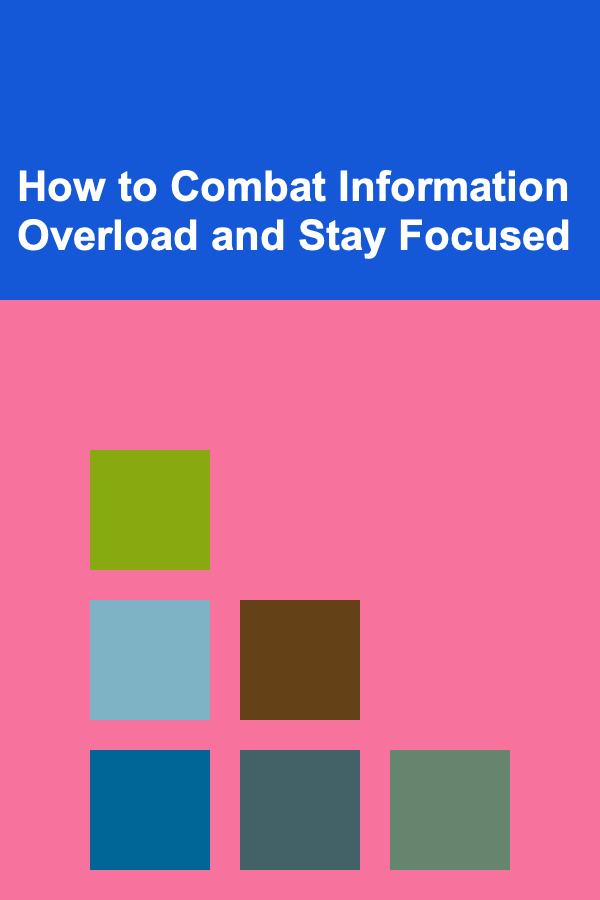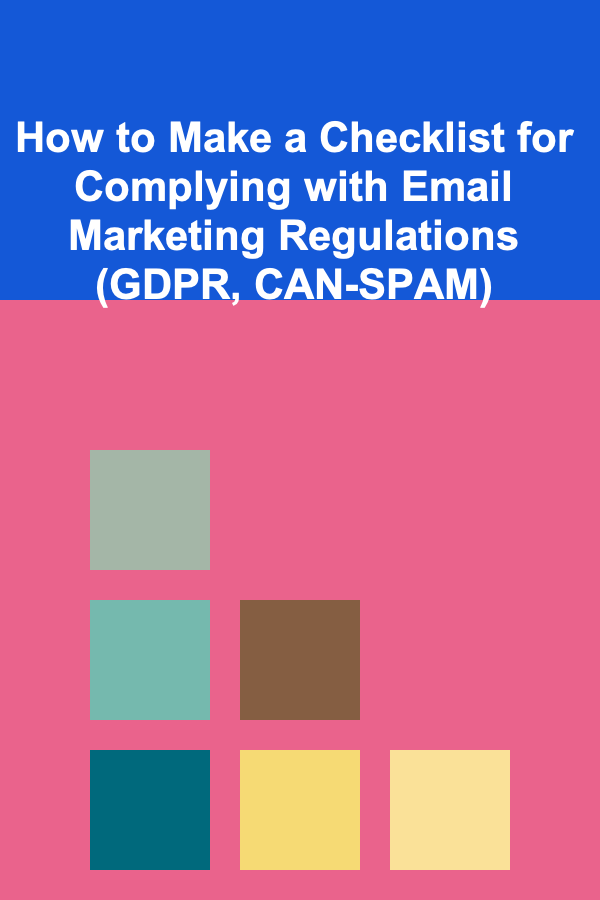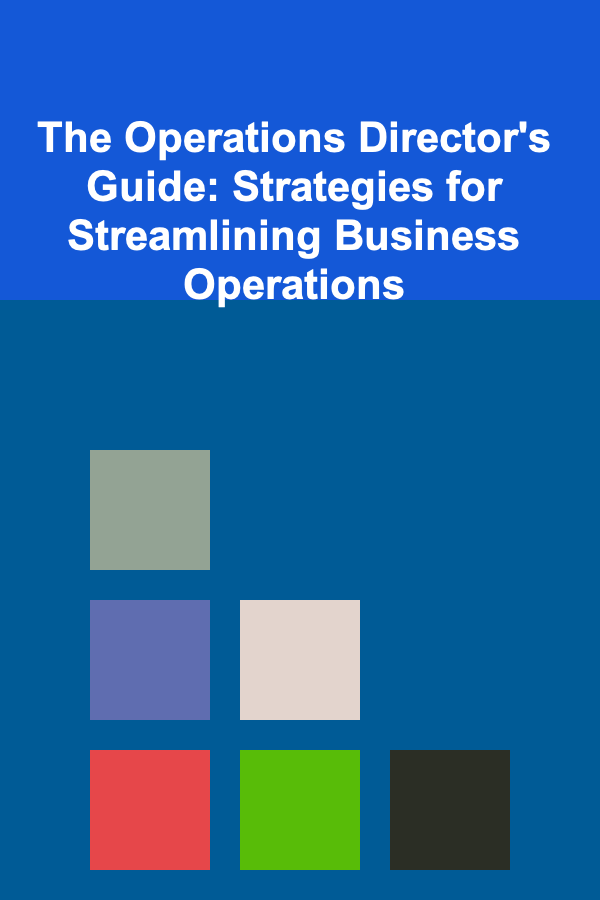
How to Combat Information Overload and Stay Focused
ebook include PDF & Audio bundle (Micro Guide)
$12.99$6.99
Limited Time Offer! Order within the next:

In today's digital age, information is constantly flowing at us from all directions. We are bombarded by emails, news updates, social media notifications, advertisements, and a plethora of other sources vying for our attention. While this information can be useful, it often becomes overwhelming---leading to what is commonly referred to as "information overload." This phenomenon can lead to stress, decreased productivity, poor decision-making, and even burnout. To thrive in such an environment, it's crucial to develop strategies to combat information overload and maintain focus. This article explores practical methods for managing excessive information, ensuring that you can stay productive, calm, and focused.
Understanding Information Overload
Before diving into solutions, it's essential to understand what information overload is and why it happens. Information overload occurs when an individual is exposed to more information than they can process or use effectively. This situation can lead to cognitive overload, where the brain struggles to filter out irrelevant information and prioritize what's important.
The main culprits behind information overload include:
- Constant connectivity: With smartphones, email, social media, and instant messaging, we're always connected to a stream of new information.
- The rise of multimedia: Videos, podcasts, blogs, and news articles add to the noise, making it harder to focus on the most relevant sources.
- Lack of focus: With so many distractions, it's challenging to concentrate on a single task for any extended period.
- Fear of missing out (FOMO): The fear of missing crucial updates, trends, or news often compels people to consume information compulsively.
Information overload not only affects our ability to focus but also our mental well-being. It can cause anxiety, decision paralysis, and a sense of being constantly behind.
Strategies to Combat Information Overload
While it's impossible to eliminate all the information coming your way, you can take control of your environment and practices to reduce the impact of information overload. Below are several actionable strategies to help you manage information overload and stay focused.
1. Practice Digital Minimalism
Digital minimalism is the art of intentionally reducing the number of digital tools and platforms you use. By limiting the amount of information you consume and the number of apps or platforms you engage with, you can reclaim your focus and mental energy.
- Declutter your devices: Evaluate the apps and tools you use daily. Are they truly adding value to your life, or are they just contributing to information overload? Delete or unsubscribe from apps that aren't necessary.
- Limit social media: Social media platforms are designed to keep you hooked, showing you a constant flow of content. By limiting your time on these platforms, you can avoid the temptation of endless scrolling.
- Turn off notifications: Notifications are the enemy of focus. Turn off non-essential notifications on your phone, computer, and apps to avoid constant interruptions.
Digital minimalism isn't about completely disconnecting; it's about using technology intentionally and only engaging with the information that truly serves your goals.
2. Implement Time Blocking
One of the most effective ways to combat information overload is by organizing your day into blocks of time dedicated to specific tasks or types of information. Time blocking allows you to structure your day so that you can focus on one thing at a time without being pulled in multiple directions.
- Block time for deep work: Set aside uninterrupted blocks of time where you can focus on a single task. During this time, avoid checking emails, social media, or other distractions.
- Schedule information consumption: Instead of mindlessly browsing or checking the news whenever you feel the urge, allocate specific times during your day to consume information. For example, designate 30 minutes in the morning to catch up on the news or industry updates.
Time blocking ensures that you dedicate enough time to focus deeply on important tasks while managing the influx of information at set intervals.
3. Prioritize Your Information Sources
Not all information is equally important. Some sources are more relevant to your current goals and projects, while others are simply distractions. To stay focused, it's important to prioritize the information you consume.
- Create a hierarchy of sources: Identify the most important sources of information that align with your personal or professional goals. These might include industry journals, newsletters from trusted sources, or work-related updates.
- Use information filters: Tools like RSS readers, email filters, or news aggregation apps allow you to control the types of content you receive. These tools can help you focus on high-quality, relevant information while filtering out less important sources.
By limiting the amount of information you consume and ensuring that it's relevant, you can prevent yourself from getting bogged down by unnecessary noise.
4. Use the Pomodoro Technique
The Pomodoro Technique is a time management method that promotes focus by breaking work into intervals (usually 25 minutes), separated by short breaks. This approach can be particularly effective in combating information overload because it encourages sustained focus for a set amount of time and then allows for a mental reset.
- Work in intervals: During each Pomodoro session, focus entirely on the task at hand. Set a timer and work without checking emails, social media, or other distractions.
- Take regular breaks: After each Pomodoro interval, take a short 5-minute break. Use this time to step away from your work and reset your brain.
The Pomodoro Technique is particularly helpful for tasks that require deep concentration, as it ensures that you aren't overwhelmed by constant distractions.
5. Mindfully Consume Information
Mindful consumption of information involves being present and intentional about the content you engage with. Instead of mindlessly scrolling or multitasking, you focus fully on the task of consuming information. This practice helps you process and absorb the information more effectively.
- Limit multitasking: Multitasking can be an illusion; you might think you're getting more done, but it often leads to mental fatigue and mistakes. Focus on one task or piece of information at a time.
- Take breaks to process information: After consuming a large amount of information, take time to reflect. This allows your brain to process and retain the information rather than simply moving on to the next thing.
- Engage with quality content: Prioritize high-quality, valuable content that helps you grow or solve problems, rather than consuming random, low-value information.
By being mindful of the information you consume and how you engage with it, you can prevent yourself from becoming overwhelmed and ensure that you retain what's most important.
6. Create Information-Rich but Distraction-Free Environments
Your physical and digital environments play a significant role in your ability to focus. Creating an environment that minimizes distractions can help you manage information overload and stay focused on what matters most.
- Design a quiet workspace: Whether you work from home or in an office, make sure your workspace is free from distractions. This could include noise-canceling headphones, a clutter-free desk, or a designated work area where you can focus.
- Use website blockers: During work or focus periods, use website blockers or apps that prevent you from visiting distracting sites like social media or entertainment platforms.
- Organize your digital files: A messy desktop or overflowing email inbox can contribute to feelings of overwhelm. Take time to organize your digital space so that you can quickly find the information you need without wasting time.
By setting up an environment that encourages focus and minimizes distractions, you can more easily manage the flood of information around you.
7. Develop Information Filtering Skills
In a world where information is abundant, the ability to filter out irrelevant or low-quality content is a valuable skill. Learning how to sift through the noise and identify what's most relevant can save you a lot of time and mental energy.
- Evaluate the source: Before diving into an article, video, or social media post, consider the credibility of the source. Is it reliable? Is it aligned with your values or goals?
- Skim before diving deep: Before investing too much time in consuming a piece of content, quickly skim it to see if it's worth your attention. If it doesn't offer new or relevant insights, move on.
- Learn how to say "no": Part of filtering information is knowing when to stop consuming content. If something doesn't contribute to your personal or professional development, give yourself permission to walk away.
The ability to filter out unnecessary information is an essential skill in preventing information overload.
8. Set Clear Boundaries Around Information Consumption
In addition to organizing your environment and managing your digital tools, setting clear boundaries around your information consumption is critical. This might involve creating designated times to check emails, social media, or news and then sticking to those time limits.
- Use scheduled time for emails and messages: Instead of constantly checking your inbox, designate specific times during the day to respond to emails and messages. This can prevent your workday from being interrupted by constant communication.
- Limit news consumption: Stay informed but don't get consumed by the news cycle. Designate a set time each day to check the news, and avoid checking it throughout the day.
- Set boundaries with others: Let colleagues, friends, and family know when you need uninterrupted focus time. Setting these boundaries helps protect your mental space.
By creating these boundaries, you can ensure that you stay in control of the information you consume and prevent it from becoming overwhelming.
9. Focus on the Process, Not Just the Outcome
Finally, focusing on the process instead of just the outcome can help you manage information overload. When you're too focused on the end goal, you might feel pressured to absorb as much information as possible, leading to overload. Instead, shift your mindset to focus on the steps you need to take to achieve that goal.
- Break down goals into smaller tasks: Instead of focusing on the ultimate result, focus on the individual tasks required to reach it. This makes the process more manageable and less overwhelming.
- Celebrate small wins: As you complete each step, celebrate the progress. This positive reinforcement helps keep you motivated and reduces feelings of being overwhelmed.
By focusing on the process, you allow yourself to be more present and engaged with the information you need, rather than feeling consumed by the weight of all the information around you.
Conclusion
Information overload is a significant challenge in the modern world, but with the right strategies in place, it's possible to manage it effectively. By practicing digital minimalism, prioritizing relevant information, setting boundaries, and creating focused environments, you can regain control over the flood of information and stay productive. While it may take time and conscious effort to implement these strategies, the benefits of reduced stress, increased focus, and better decision-making are well worth the investment. In a world that's constantly trying to pull our attention in multiple directions, staying focused is not only possible---it's essential.
Other Products

How to Make a Checklist for Complying with Email Marketing Regulations (GDPR, CAN-SPAM)
Read More
How to Make the Most of Your Hallway with Space-Saving Ideas
Read More
How to Open Up a Small Kitchen with Creative Renovation Ideas
Read More
How to Organize Your Craft Supplies for Creative Flow
Read More
The Operations Director's Guide: Strategies for Streamlining Business Operations
Read More